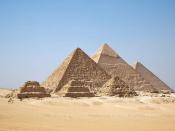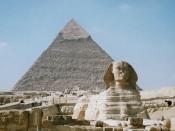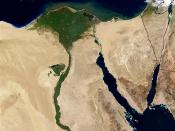Ancient Egypt
The giant pyramids, temples, and tombs of ancient Egypt tell an exciting story about a nation that rose to power more than 5,000 years ago. This mighty civilization crumbled before conquering armies after 2,500 years of triumph and glory. The dry air and drifting desert sands have preserved many records of ancient Egypt until modern times.
The ancient Egyptians lived colorful, active, and eventful lives. Many were creative artists, skilled craftsmen, and adventurous explorers. Bold Egyptian warriors won many battles, and their rulers governed wide areas of the known world. The ancient Egyptians loved nature and had a lively sense of humor. They were among the first people to try to find answers to questions concerning man, nature, and God. They also considered the relationship of man to society, but regarded other people as savages. They captured and enslaved thousands of men and women from other lands.
The Greek historian Herodotus called Egypt the gift of the Nile, because floodwaters of this great river deposited rich, black soil on the land year after year.
Egyptian farmers planted their crops in this fertile soil. Sandy plateaus and towering cliffs bordered the river valley. Beyond these waters stretched the barren wastes of the Sahara desert. On the edge of the desert, the Egyptians built giant pyramids as burial places for their pharaohs. They carved the Great Sphinx out of solid rock as a guardian of King CheopsÃÂ Great Pyramid at Giza. The ancient Egyptians called their country Kemet, which means black (after the land). The Greeks called the country Aigyptos, from the name Ha-ka-ptah, the main temple of the Egyptian capital at Memphis.
Many modern beliefs and ideals, as well as much of manÃÂs knowledge, had their origin in Egypt. The ancient Egyptians developed the worldÃÂs first national government.


